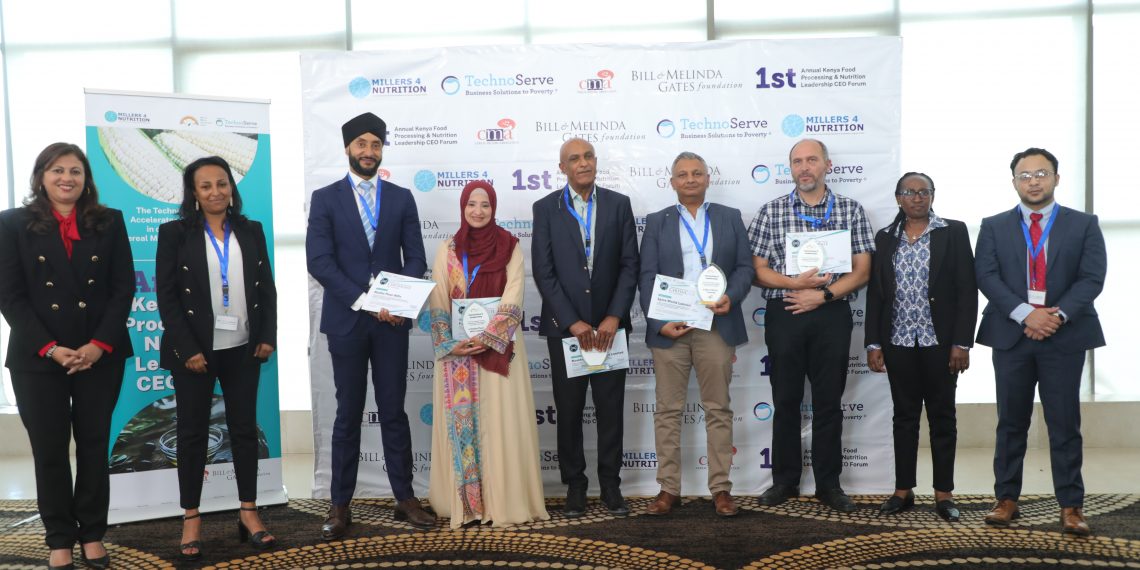Cereal Millers Association (CMA) and TechnoServe- an international non-profit organization- convened the 1st Annual Kenya Food Processing and Nutrition Leadership (CEO) Forum, which brought together stakeholders from the private sector, government, and civil society to highlight the role of millers in supporting nutrition, address shared challenges, and officially launch the Kenya Millers Fortification Index (KMFI).
According to the Kenya Demographic Health Survey (KDHS, 2022), the prevalence of stunting has reduced from 26 percent in 2014 to 18 percent in 2022. This can be attributed to food fortification efforts.
However, 18 percent of children under age 5 are still stunted, or too short for their age. This is a sign of chronic undernutrition. In addition, 32 percent of children are anemic, posing a threat to their learning abilities and increasing the risk of infections due to compromised immunity.
The KMFI aims to facilitate and strengthen the commitment of leading flour millers toward providing consumers with greater access to nutritious and sufficiently fortified food products, with the intention of scaling the initiative to include other staple foods. This will be achieved through their participation in a self-regulatory and award scheme, where they can place improved nutrition at the core of their brand-building efforts and project a mark of quality to consumers.
Additionally, the information gained from emerging performance trends and analysis will provide effective data for policymaking and further inform the design of impactful nutrition-related interventions driven by the private sector. Strategic partnerships and thematic communications have been deployed to enhance the impact of this project and keep stakeholders updated on relevant findings.
The final scores on the index are based on a self-evaluation tool, industry insights provided by an independent expert group, and product quality testing assessing fortification and aflatoxin levels against national standards. The KMFI’s rankings provide significant benefits to the food ecosystem and to participating food processors such as:
Providing compliance ratings of the participating brands, therefore, highlighting and positioning brand quality to consumers. Showcasing companies’ efforts on a platform that promotes a shift to industry-driven fortification compliance. Improving the relationship with—and supporting the effectiveness of—regulators.
Serving as the basis of an award scheme that highlights fortification compliance, acknowledges incremental process improvements, and recognizes innovations in quality management.
CMA, representing about 40 percent of the total maize milling capacity and over 90 percent of wheat milling capacity in Kenya, has become a key partner in providing safe, affordable, and high-quality cereal flour, including maize and wheat, to Kenya’s population.
The association has taken initiatives aimed at self-regulation and remains committed to serving as a pioneer in establishing the food fortification program in Kenya.
However, negative publicity resulting from increased scrutiny by government regulators and the media on issues related to aflatoxin mitigation and food fortification has led to the loss of business to millers, lower consumer confidence, and erosion of reputation for many CMA member brands.
“We don’t need to be mandated to produce safe food and nutritious food. It should be part of what we do. We must always keep doing the right things. We’d like to see the regulators get involved, we’d like the consumers to get involved and start demanding for more nutritious food and I think these are the ways that we can really scale up fortification and the KMFI.” said Paloma Fernandes CMA CEO
According to the World Health Organization, Large Scale Food Fortification (LSFF) is a proven strategy to address malnutrition at scale and entails a process of deliberately increasing the content of one or more micronutrients such as vitamins and minerals in widely consumed staple foods. In 2005, the Kenya National Food Fortification Alliance was formed to spearhead the country’s planning, implementation, and monitoring of fortification initiatives.
The alliance comprised members from the Ministry of Health, Kenya Bureau of Standards, research institutions, UN agencies, development partners, and umbrella bodies from the cereal millers, salt, and oil industries. In 2012, fortification standards were set, and legislation was passed making it mandatory for the fortification of maize, wheat, and oil.
KMFI’s launch follows TechnoServe’s Technical Assistance Accelerator Program (TAAP) funded by the Bill and Melinda Gates Foundation that is working with leading food processors across 8 countries in Africa and Asia to improve nutrition at scale through the sustainable adoption of fortification practices. Working hand-in-hand with CMA millers to bolster industry compliance to meet mandatory national standards of fortification, the initiative recognizes that improving nutrition requires a business perspective, engaging food processors as an influential ally.
“It is critical in this time of drought, this time of food insecurity to be thinking about brands you can trust, who are putting nutrition, malnutrition, and food security in the core of what they do as a business. That’s one of the most critical benefits of the KMFI. It’s good for the business, it’s good for the consumer given the visibility and transparency,” said Kris Ansin Country Director, Kenya














